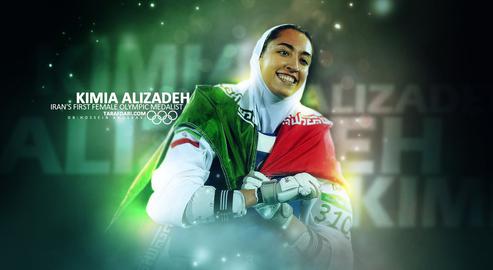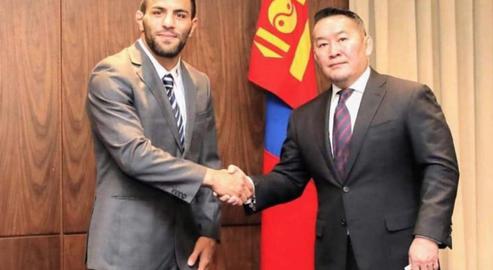Iranians migrating to other countries is nothing new. Athletes are among the many people, of all backgrounds, who have left Iran either as students, professionals or refugees, ultimately changing citizenships, in the four decades since the 1979 establishment of the Islamic Republic. But now this wave of departures has picked up speed.
The record for departures by Iranian elite athletes was broken this past year. The latest examples, just in the past week, were Iran’s top female tae kwon do fighter, Kimia Alizadeh, and Shohreh Bayat, the country’s leading chess referee.
Kimia Alizadeh is more than just another elite athlete – she was the first Iranian woman to win an Olympic medal. She was only 18 when she won the bronze medal for tae kwon do at the 2016 Rio de Janeiro Olympic Games. After the Olympics, it was revealed that Alizadeh had gone to Rio with an injured cruciform ligament and the Iranian Tae Kwon Do Federation announced that she suffers from the Guillain-Barré syndrome; as a result, she may not be able to return to championship competitions.
Guillain-Barré syndrome is a rare disorder in which the body's immune system attacks the nervous system. Weakness and tingling in the extremities are usually the first symptoms. But these can quickly spread, eventually paralyzing the whole body.
The head of Iran’s woman Tae Kwon Do National Team, Mahro Komrani, later announced that Alizadeh was out of danger and could return to competing within a year. But the Iranian Tae Kwon Do Federation pushed Alizadeh out completely and for more than two years she was not allowed to compete; and then a picture of her with Dutch tae kwon do athletes, in which she was not wearing mandatory hijab, was published.
The Unforgivable Sin
In the eyes of the Islamic Republic, the presence of an Iranian woman athlete or referee in international competitions, without hijab, is an unforgivable sin. Before her, hardline media had pummelled Dorsa Derakhshani, the second female chess grandmaster in Iran’s history, for appearing without hijab at an international tournament.
Dorsa, 19 at the time, and her 15-year-old brother Borna Derakhshani, played for Iran in the 2017 Gibraltar Chess Festival. The news of their participation led to outrage in hardline media because, as Fars News Agency reported, Dorsa was did not wear hijab and Borna had dared to play against an Israeli.
The previous year, on December 23, 2016, Dorsa told the website Beyond Chess that she found the hijab “disturbing.”
“I once wore a formal sort of hijab,” she added, “as we have different ones depending on the occasion, that was seriously disturbing me as it was tied too tight. On the other hand, in Iran people know and accept that foreigners are neither familiar with, nor particularly willing, to wear a hijab.”
After the Gibraltar chess tournament, Ahmad Salek, an influential hardline member of Iran’s parliament, said “there is no reason for individuals with dual nationality, who do not believe in the [Islamic Republic] system, to compete under the Iranian flag.” He went even further and said that Iran’s security agencies should deal with the Derakhshani siblings and urged them to take “serious action” against the two.
This was enough for Dorsa to decide to leave Iran. She left for the US and has been competing for the Untied States for the past three years.
Dorsa, of course, is not the only Iranian athlete who has run afoul of the Islamic Republic because of hijab controversies. Shohreh Bayat, an international arbiter with the International Chess Federation (FIDE), last week appeared without her hijab at the Women's World Chess Championship in Shanghai.
Bayat’s father insisted that the picture of Shohreh without her hijab was just “mischief [caused] by photographers,” in comments given to the Iranian Students’ News Agency (ISNA). “Her scarf fell from her head for a moment and the photographers snapped pictures of her. She herself was surprised by her picture and after she returns she will explain this to the Federation president.”
But Shohreh Bayat herself rejected this excuse and announced that she was not returning to Iran.
Bayat’s father later said, on comments reporter by ISNA on January 10, that he, Shohreh’s mother and even the head of the Iranian Chess Federation had “tried hard to convince her to come back to Iran, but she says she will not because she is worried about living her life and pursuing her career here and she wants to continue in another country, with the help of the International Chess Federation.”
Exploiting Sports to “Export Revolution”
Obedience of the hijab laws when abroad as a “red line” is set by the Islamic Republic – not only by sports authorities. On March 11, 2013, in a speech during a meeting with Iranian Olympic and Paralympic medalists, Supreme Leader Ayatollah Ali Khamenei said that "Everybody should appreciate from the bottom of their heart the value of women athletes who participate in international sports arenas [wearing their] hijab and with modesty." He also praised athletes who do not shake hands with the opposite sex when they receive a medal. “You are exporting the Iranian revolution to the world from the sports arena,” he told the medalists.
In April 2019 Sadaf Khadem, the Iranian woman boxer who had stepped into the ring in France without hijab, asked for and was granted, asylum in that country.
“After we were informed that, if Sadaf Khatam returns to Iran she would be in trouble, we decided that she should stay in France and not go back to Iran,” said Mahyar Monshipour, a former Iranian boxing champion and a member of the French women’s boxing team who coached Sadaf Khademi.
Defeat is acceptable; competing against Israelis is not
It is not only women athletes who have been fleeing Iran. It appears that, after hijab, the ban on competing against Israeli athletes is the most important push factor in the exodus of elite Iranian sports professionals from the country.
In February 2019, Mobin Kahrazeh, a member of Iran’s National Boxing team, sought asylum in Austria. He told IranWire that, before leaving Iran for international competitions, sports officials told him that he must intentionally lose matches in order to avoid facing Israeli boxers.
“They said that ‘if there is an Israeli in your group, lose at the first match.’ I said: ‘I will not lose. I did not practice for years to go and lose the first match. I will fight.’” Afterwards, he received threats and decided to seek asylum in Austria instead of returning to his homeland.
But the best-known case appears to be Saeid Mollaei, a world judo champion who went to Germany after he was ordered to intentionally lose in the semifinal at the Tokyo 2019 World Championships, so as to avoid a potential match in the finals against the Israeli judoka Sagi Muki. In his interviews with the International Judo Federation (IJF) and Persian-language media outside Iran, he talked about receiving pressure from Iranian government officials to prevent Iranian athletes from competing against Israelis.
Following Mollaei’s exposé, in September 2019 IJF officially suspended Iran’s Judo Federation. Mollaei was granted asylum by Germany. He now fights as a member of the Mongolian judo team.
A third notable sports figure who left Iran as a result of the ban on competing against Israelis was Alireza Firouzja, the Iranian chess prodigy. Firouzja was only 13 when he defeated Ehsan Ghaem-Maghami, the first Iranian chess grandmaster. He later achieved success after success and won titles that no Iranian chess player had before received.
In December 2019m, Firouzja was the world's No. 2 ranked teenage player and won the silver medal at the World Rapid & Blitz Chess Championship in Moscow, after competing under the flag of the International Chess Federation (FIDE). He decided not to compete under the Iranian flag because of the ban on competing against the Israelis. Firouzja and his father later moved to France and he has since changed his citizenship.
A short while before Firouzja changed his nationality, the Iranian Ministry of Sports had ordered Iran’s chess federation to prevent members of its national team from going to Moscow, presumably because the chances were high that Iranian and Israeli chess players would have to face each other.
“Sports are separate from politics”
Let us not forget Mohammad Rashnonezhad, the Iranian judoka with six Asian gold medals, who sought asylum in the Netherlands in 2017 after officials of the Iranian Judo Federation pressured him to avoid competing against Israelis. In November 2019 he announced he would compete at the Tel Aviv Grand Prix in January, as a member of the International Judo Federation's refugee team. In an Instagram post announcing his decision to come to Tel Aviv, Rashnonezhad said he hoped to positively represent Iranian athletes and the Iranian people, and show that "sports are separate from politics."
These are just a few of the many Iranian athletes who have left their home behind. Iran’s politics relentlessly dominates sports – forcing out many talented athletes. Additional push factors are the economic crisis and widespread mismanagement in the country.
Other Iranian champion athletes who have immigrated, sought asylum or have changed their citizenships include, but are not limited to, wrestler Saman Tahmasebi, tae kwon do fighter Milad Beigi, judoka Shayan Nassirpour, Reza Mehmandoust, under whose management Iran's National Tae Kwon Do team became world champions in 2011, boxers Anooshirvan Nourian, Mahmoud Zavieh and Pouria Pour Ebrahim, members of the national surf lifesaving team, fencer Mohammad Hossein Ebrahimi and judo champion Ehsan Rajabi.
Altogether, it now seems that the exodus of Iranian athletes is accelerating.
Related Coverage:
Foreign Sports Coaches Are Fleeing Iran, 9 January 2020
Iranian Judo Federation Suspended — And Now all Iranian Sports are at Risk, 18 September 2019
Iranian Wrestlers May be Ordered to Lose Again to Avoid Facing Israelis, 9 September 2019
Iranian Judo Champion Forced to Avoid an Israeli Competitor Leaves, Settles in Germany, 2 September 2019
Iran's Female Boxer Makes History in France, 15 April 2019
The Iranian Fugitive Boxer Who Said No to the “Israel Ban”, 25 February 2019
Chess Grandmaster's Brother Also Abandons Iran, 6 October 2017
Iranian Female Chess Grandmaster Abandons Iran for America, 3 October 2017
Meet Iran’s Taekwondo Genius, 4 July 2017
visit the accountability section
In this section of Iran Wire, you can contact the officials and launch your campaign for various problems


























comments